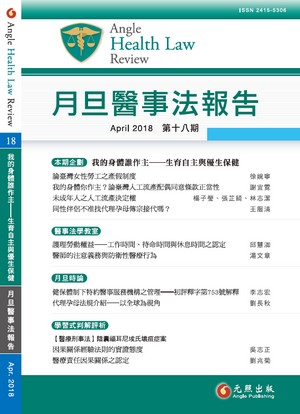我的身體你作主?論臺灣人工流產配偶同意條款正當性【本期企劃】 試閱
My Body, Your Decision? The Legitimacy of the Abortion Spousal Consent Clause in Taiwan
臺灣自1984年優生保健法制定後,允許女性在符合特定構成要件情況下實行人工流產,並得援引優生保健法之規定,作為阻卻刑法墮胎罪成立之事由。如此看來,立法者似有意在相當程度上賦予女性決定是否實施人口流產之自由空間。然而,依據優生保健法第9條第2項規定,倘已婚女性欲以「懷孕或生產將影響其心理健康或家庭生活」為由實行人工流產,除前述要件外,尚須取得配偶同意始可為之,此一配偶同意要求之規範基礎何在?又是否會對女性生育自主權利構成不當之限制?本文擬分析臺灣優生保健法人工流產配偶同意條款之立法歷程,並比較國內外法院之判決之實務見解,檢討臺灣優生保健法人工流產配偶同意條款之正當及妥適性。
Under the Criminal Code of the Republic of China, abortions are considered as criminal offences. However, women may be exempted from criminal liability if the conditions set forth in the exception clauses provided in Article 9 of the Genetic Health Act are met. Although the Act acknowledges women’s autonomy to decide over their own bodies, the provision still requires married women who seek for abortion with the reason of “pregnancy or childbirth is likely to affect their mental health or family life” to acquire the consent of their spouse prior to receiving the treatment. This study shall reference the relevant US Supreme Court cases to examine the adequacy of enacting the spousal consent clause. With the goal to assess and clarify the legitimacy of incorporating the spousal consent clause, this study shall also analyze the legislative history and judicial decisions in Taiwan over the enactment and implementation of the spousal consent clause.
016-028






